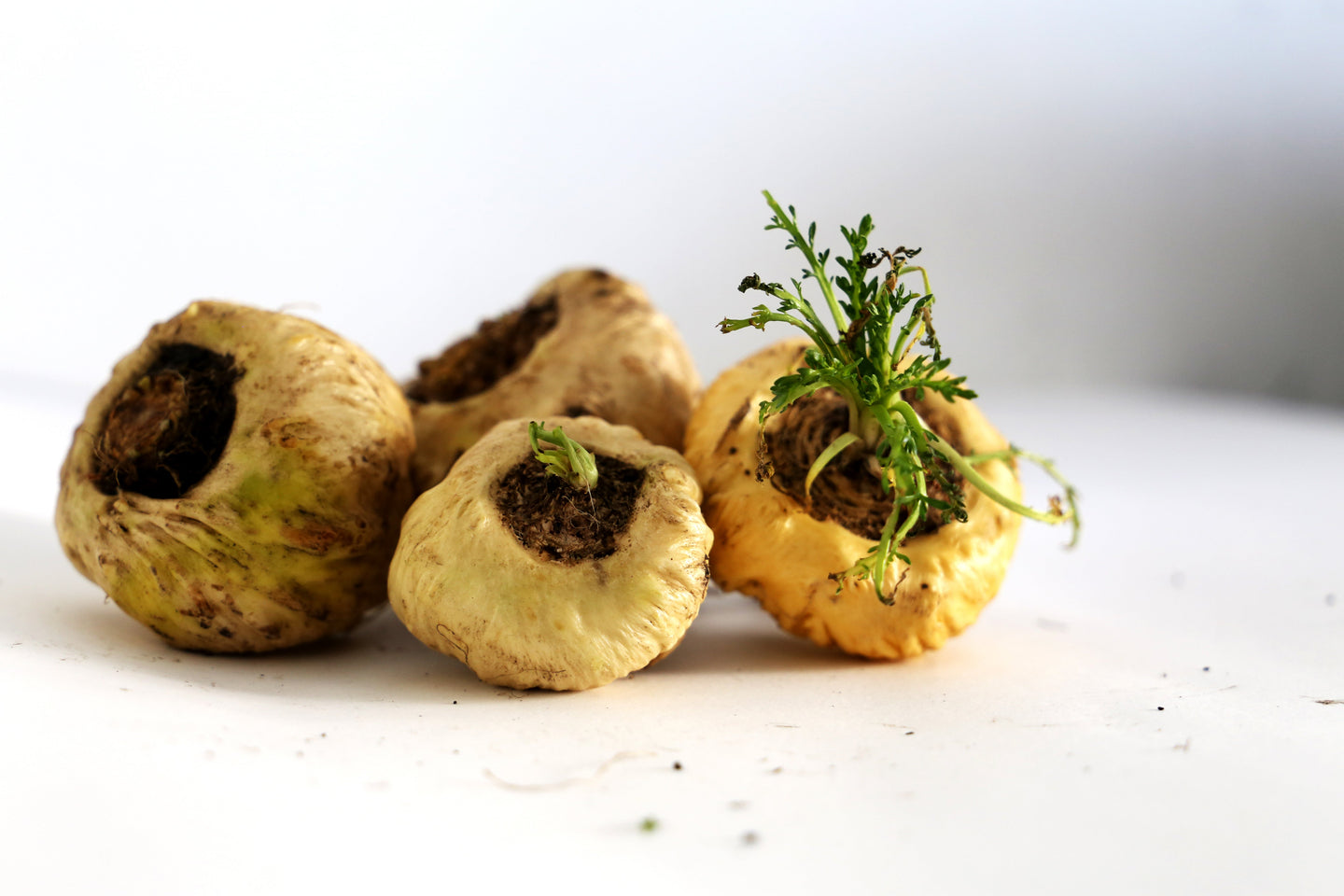
What Maca Can Do for Your Health: A Complete List of Maca Health Benefits
Maca is a cruciferous vegetable native to the high Andes of Peru, where people have used it as food and traditional medicine. This herbaceous plant is also known as Peruvian ginseng or Lepidium meyenii in scientific circles.
The indigenous people of the Andes Mountains used maca for thousands of years. In fact, records indicate that Peruvians used maca for almost 6000 years and domesticated it 2000 years ago. They used it to promote fertility, enhance strength, and improve endurance.
Today, maca is grown in other parts of the world, including Europe, Asia, and the US. We use maca energy drinks or dietary supplements to promote cognitive performance, stress resilience, mood, and overall vitality.
But can maca do all that? Before we jump into science, let’s see why native Peruvians valued maca so much.
The Origins of Maca as an Adaptogen and Superfood
An adaptogen is a natural substance (usually a plant extract) believed to support homeostasis by helping your body better handle (adapt to) the effects of stress. They’re thought to accomplish this by acting on key nervous system structures, chemicals, and signaling.
Maca is considered a superfood with adaptogenic properties that may help combat the effects of stress, thus allowing the body to maintain a state of equilibrium.
Maca’s use as a food and medicinal plant dates back to the pre-Incan cultures that inhabited the Andes Mountains thousands of years ago. The indigenous people of the Andes Mountains used this potent herb to enhance fertility in both men and women.
The Incas later incorporated maca into their diet and used it for medicinal purposes. Incan warriors often consumed maca elixirs before battle to increase their strength and endurance.
Since maca natively grows high up in the mountains (7,000 to 11,000 feet), where only a few plants can survive, farmers used it to help them cope with the high altitudes and extreme weather conditions of the Andes.
The plant was so valuable that it also served as currency. The cultivation of maca was strictly controlled by Inca rulers, who reserved this plant for royalty and warriors.
Maca still grows in the central highlands of Peru, where it serves as an important crop to local people. They use it for food, medicine, and trade. However, maca’s use has recently spread worldwide, as this superfood is believed to have many health benefits.
As a superfood, maca is highly nutritious, which makes it an excellent source of vitamins, minerals, and antioxidants. It contains proteins, fibers, and complex carbohydrates, which provide sustained energy. There are also many bioactive compounds, including alkaloids and flavonoids, that may have health-promoting effects.
Modern Use and Health Benefits of Maca
The modern-day craze for maca began in the early 2000s when it was first touted as a natural energy booster and aphrodisiac. People began to take notice of maca’s health benefits and started incorporating it into their diets in various forms – from supplements to smoothie bowls.
Maca was traditionally dried after harvesting and then boiled before consumption. Today, maca usually comes in powder or capsule form. Maca powder is the most popular because you can easily add it to smoothies, pancakes, oatmeal, baked goods, and other foods and drinks.
Some brands also offer maca energy drinks that are supposed to provide an energizing effect that doesn’t overwhelm your brain and helps you deal with stress more effectively. That sounds great for staying productive during those short work deadlines.
Of course, there’s always a bit of skepticism when a new health trend emerges. But, as more and more studies supported the claims about maca’s bioactivity, its popularity continued to grow. And let’s be honest, who doesn’t need a little extra energy and passion in their lives?
Nowadays, you can find maca in a variety of products – from chocolate bars to stress relief drinks. And while some may still scoff at the idea of a “superfood,” there’s no denying that maca has made a name for itself in the health world.
Today, people use maca for:
- Energy levels and endurance
- Combating stress
- Better mood
- Inflammation
- Cognitive function
- Skin health
- Overall health boost
This all sounds great, but there’s probably one question in your mind: Can maca really help with all of these things?
Let’s see what science has to say about it.
Clinical Evidence Supporting Maca’s Health Benefits
Maca has been used for thousands of years for its supposed benefits, but what does scientific research say? In this section, we’ll take a closer look at the studies that have explored the potential health effects of maca and see what they discovered.
Let’s dive in!
1. Maca May Boost Energy Levels and Physical Performance.
Maca has become relatively popular in the fitness world, as some athletes and bodybuilders use it to increase energy and boost performance. However, we have limited evidence to support this.
A pilot study examining the effects of maca on sports performance saw short-term supplementation improve performance in male cyclists. Cyclists who took maca supplements had better 40km cycle trial times than those who didn’t.
These results are in sync with animal studies, where maca successfully increased swimming endurance in rats.
Although we need more evidence to establish how maca affects physical performance, these results are promising, especially for athletes looking for something extra to promote their endurance.
2. Maca May Improve the Body’s Response to Stress.
Maca is an adaptogenic herb, and adaptogens help the body react better to stress. This is supported by animal research, where one study observed maca extract helps rats restore homeostasis and reduce the effects of stress. Rats consuming maca experienced an improvement in standard stress parameters and stress-induced ulcers.
3. Maca May Ease Struggles with Emotional Regulation.
The great thing about adaptogens is that they can help with stress and mood – it’s that whole “adapt” part of adaptogens. It appears that maca is no different, as a 2016 safety trial indicated that this adaptogenic herb may contribute to better mood and improved subjective quality of life.
Maca contains a powerful form of polyphenols called flavonoids. These compounds have anti-inflammatory and antioxidant properties, perfect for improving challenges associated with low mood and stress reactivity. And although we don’t know the exact mechanism behind maca’s effects on mental health, flavonoids certainly play an important role in supporting it.
A 2014 study discovered that daily supplementation with maca helped mice fight off the effects of chronic stress. The results showed lower levels of the stress hormone and increased levels of feel-good chemicals in the brain. These effects improved mood, which was observed as positive behavioral changes, hinting at the great potential of maca to aid mental health.
Another pilot study investigated whether maca had any mental health benefits on postmenopausal women. It turns out that 12 weeks of supplementation helped lower the blood pressure and reduce feelings of sadness and despair.
All these results show that maca has the potential to improve mood and help support against things like adverse thinking and rumination. However, we need a few more studies to solidify these claims.
4. Other Health Benefits
Maca may also have other benefits, as various studies have investigated its potential. For example, a trial published in the International Journal of Biomedical Sciences revealed that maca relieved symptoms of menopause, like hot flashes and night sweats.
There have also been case reports where supplementation with maca helped with recovery, stress, and hot flashes during menopause.
However, a systematic review warns that we need larger and better quality studies to determine the safety and efficacy of maca for menopausal treatment.
What we do know is that maca contains polyunsaturated acids, which are nutrients vital for bone health. One study in rats confirmed the link between maca and healthy bones, as the supplementation with this superfood led to improved bone health.
Similar effects were observed in a study with human subjects where bone density markers in menopausal women improved after taking maca supplements for four months.
Finally, there are some indications that maca could:
Is Maca Safe?
Maca is considered safe for most people, but keep in mind that every person is different, and what works for one might not work for another. However, there’s no need to panic and throw out your maca powder just yet. The truth is, there are very few reported cases of mild adverse effects from consuming maca.
The most common include:
- Digestive discomfort
- Headaches
- Altered menstrual cycles
- Cramps
- Moodiness
- Restlessness
Because we lack quality safety studies, certain people should avoid using this superfood. That includes people who are pregnant/nursing, people with thyroid problems, people undergoing hormone therapy, and those with reproductive conditions.
MTE: A Maca Energy Drink Powder That Takes Benefits to a New Level
Maca is not only a powerhouse of nutrients and health benefits, but it’s also incredibly versatile. You can toss it in your morning smoothie, add it to your baked goods, sprinkle it on your yogurt, or even stir it into your coffee. And now, we’ve made it even easier for you to get your daily dose of maca with MTE: a wellness companion in convenient powder form.
MTE isn’t your average maca energy drink. It’s a unique blend of 11 adaptogens, nootropics, and superfoods, all working together to support your energy levels, cognitive function, mood, recovery, and overall well-being.
These natural feel-good ingredients pack a punch with potent and sustainable support for vitality, all in a convenient powder mix.
So why settle for feeling just okay when you can reach a new health peak? Try MTE and experience the power of maca in a delicious, simple wellness mix.



